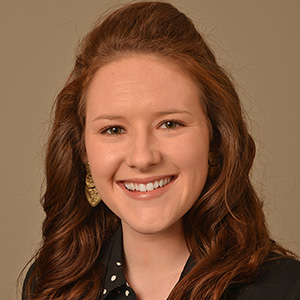Essays on Diversity in Accounting Earn Top NCACPA Scholarships for Two Poole College grads

Two graduates of the NC State Poole College of Management’s accounting programs each received first place scholarship awards from the North Carolina Association of Certified Professional Accountants (NCACPA), based on the quality of their essays on the topic of diversity in the accounting profession. (Read their essays below.)
Barry Griffith, who graduated with a Master of Accounting degree on May 13, and Callie Lane Efird, who graduated with a Bachelor of Accounting degree and will be entering the college’s Jenkins MAC program this fall, each received the first place $5,000 NCACPA Foundation Scholarship award.
“Due to the quality of their individual submissions, the scholarship review committee decided to award them both the first place scholarship,” said D. Scott Showalter, professor of practice in Poole College’s Department of Accounting.
“In addition to Barry and Callie, 12 other Poole College accounting students were awarded NCACPA scholarships,” he said. The scholarships were awarded at the NCACPA 2017 Recognition Dinner held at the Grandover Resort and Conference Center in Greensboro, N.C. on May 4, 2017.
Also, Jasmine Richardson received fourth place in the essay competition. She graduated in May 2017 with a bachelor’s degree in accounting and will be starting in the Jenkins MAC program this fall.
Griffith, originally from Winston-Salem, N.C., received his bachelor’s in accounting with a financial analysis concentration from the NC State Poole College of Management in 2016 and his Master of Accounting degree in May 2017. He currently is preparing for the CPA exam, and will begin working this fall for Deloitte in its Raleigh office, in the audit field.
“Having been a Poole College student for undergrad and the MAC program, I can confidently say that the PCOM faculty and curriculum has prepared me to start my career,” he said via an email interview with Poole College Communications. “They have helped me land internships and jobs, prepared me to succeed throughout my internships, and even assisted in winning this scholarship.”
Efird, originally from Weddington, N.C., graduated with her bachelor’s degree in accounting with a concentration in financial analysis in May 2107, and is returning to campus this fall for the Jenkins MAC program.
“This summer and after graduate school, I will be working for BDO USA, LLP, in the assurance department,” she said in her email interview response.
“My experience at Poole has been incredibly rewarding and educational,” she said. “The professors in the accounting department have given me a taste of what the real world will be like and structured their classes so that I could be prepared for the actual business world and not just succeed in a classroom setting.
“The Poole College of Management is diverse and there are many opportunities and efforts by the college to continue diversifying even further. I hope that the efforts made by Poole College will be made in the business world and that we will eventually see more minorities and women succeeding and progressing the accounting field.”
The following Poole College and Jenkins MAC program students also received NCACPA scholarships
- Rafal Baran, Jenkins MAC, 2017
- Melissa Blackman, Jenkins MAC, 2017
- Jennah Brothers, Poole College Bachelor of Accounting, 2017; will be starting in the Jenkins MAC program this fall
- Kelly Kolb, senior, Poole College Bachelor of Accounting; also received a James L. McCoy Scholarship
- Matthew Krawczyk, Poole College Bachelor of Accounting, 2017; will be starting in the Jenkins MAC program this fall
- Brooke Phillips, senior, Poole College Bachelor of Accounting
- Anne Settlemyre, Poole College Bachelor of Accounting, 2017; will be starting in the Jenkins MAC program this fall
- Andrew Slatter, Poole College Bachelor of Accounting, 2017; will be starting in the Jenkins MAC program this fall; also received a James L. McCoy Scholarship
- Trevor Warren, Jenkins MAC, 2017
Following are excerpts from the diversity essays that Griffith and Efird wrote in support of their applications for the awards.
Diversity Essay Excerpt | Callie Efird

“The CPA profession is expected to grow by 11%, with 142,400 new jobs opening in the field by 2024, per the Bureau of Labor Statistics. With an increased focus on diversification, this growth has the potential to bring new ideas and people to the field, including young millennials, international citizens and those of varying backgrounds and cultures from across the United States.
Citing Ron Glover, the chief diversity officer at IBM, she wrote, “Innovation is about looking at complex problems and bringing new views to the table. Diversity has allowed IBM to be innovative and successful for 100 years and to work across lines of differences in 172 countries, amongst 427,000 employees.”
Efird elaborated on that message, writing “Following the global trend of companies like IBM, the CPA profession has become international as well, making it more crucial than ever that diversification of professionals and inclusion of all cultures and ideals become more prevalent. On average, the Big Four public accounting firms provide services in 153 countries across the world already and this number is certain to grow even more with increasing technological advances.
“By adding a more diverse group of professionals to CPA firms and encouraging the sharing of new perspectives, the field will ultimately see improved efficiency in their methods of conducting business and growth in innovation that will be necessary to keep up with the expansion of the international economy,” she wrote.
She also challenged the accounting profession to more effectively communicate to underrepresented young people what it is that accountants do and the career opportunities that the profession offers, to “enable the field to gain fresh talent and a new outlook on the processes of public accounting services.”
Diversity Essay Excerpt | Barry Griffith

Griffith, in his essay on diversity and inclusion, reflected on his years as a youth helping his father in his workshop, where a diverse set of tools was required for various home maintenance projects.
“The workshop proves the importance of diversity and inclusion,” Griffith wrote. “If the workshop lacked a wide selection of tools, my father would be unequipped to complete his task. Likewise, without diversity and inclusion, the CPA profession would not be well suited to meet the needs of their clients. A more diverse workforce is invaluable to the future success of the CPA profession.”
He wrote that diversity includes varying perspectives, talents, beliefs, cultures, and traditions, in addition to race, ethnicity, gender, and age. This, he wrote, “will generate much more creative thinking to offer solutions to an evolving and complex business environment, as diverse teams draw on their varied perspectives.”
He cited a 2013 study published in Harvard Business Review, which stated, “team with a member who shares a client’s ethnicity is 152 percent likelier than another team to understand that client.”
“Having individuals from various cultural backgrounds helps when engaging with companies (that) have a global presence (add) a degree of cultural competency to CPA firms,” Griffith wrote. “Not only does an increased focus on diversity allow firms to better address the needs of clients, but also by recruiting a more diverse workforce, they are able to tap into a greater pool of talent.“
Significant efforts to create a more inclusive workplace are also needed, he wrote. “Simply having a diverse group in the workplace is not enough; the profession must make efforts to create an environment where all types of people can succeed. This will mean considering the needs of each individual to ensure they are valued, respected, and supported,” he wrote. “Management should create opportunities for cross-generational and racially diverse teams to incite critical thinking. Investing in team-building and leadership programs would also instill competencies that foster successful teams. To fully realize the benefits of diversity, firm’s leadership must prioritize inclusion.”


